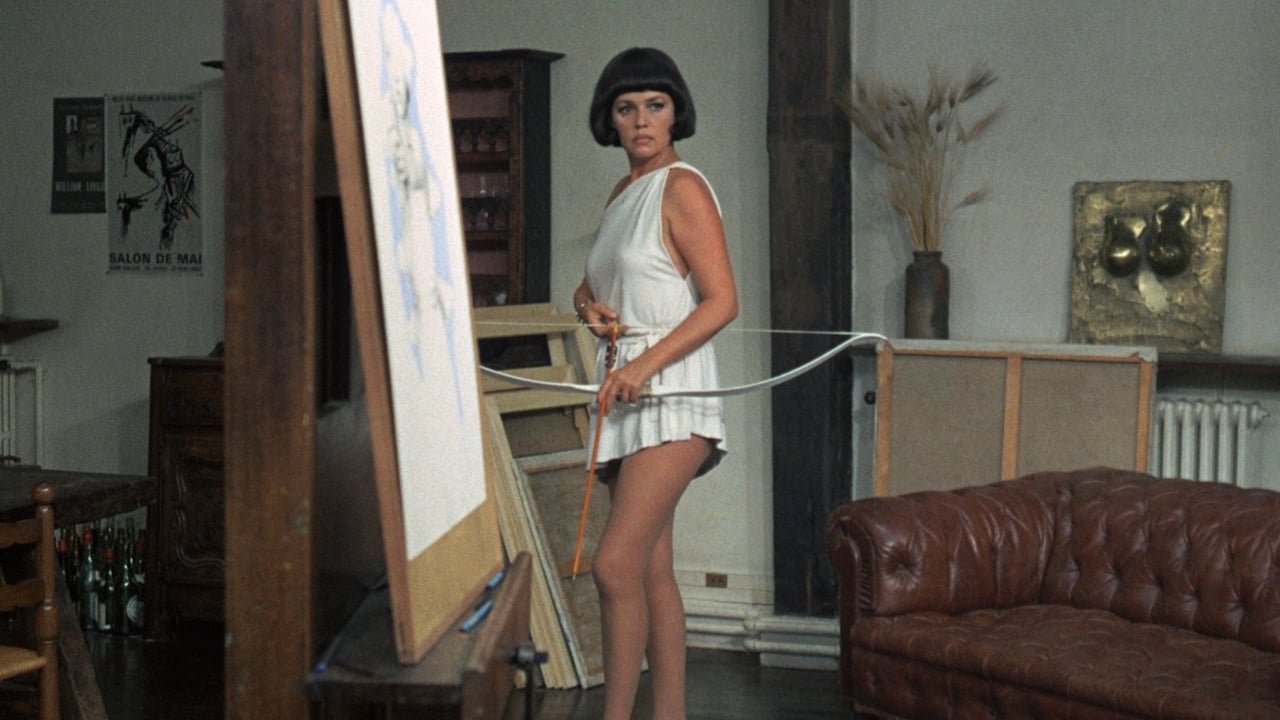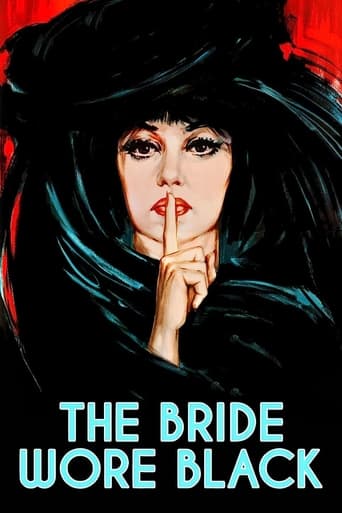

Francois Truffaut greatly respected and admired the work of Alfred Hitchcock and "The Bride Wore Black" is his homage to the great director. It's a movie that's fascinating to watch because of the skillful way in which the story's important background information is gradually revealed but also because it's highly entertaining in the conventional sense. Its off-beat nature, its numerous Hitchcockian elements and the mystery surrounding the stony-faced widow who embarks on a murder spree are just some of the strong features of this tense revenge thriller which interestingly, also incorporates some of the more gentle and light qualities that are typical of Truffaut's work.Julie Kohler (Jeanne Moreau) is the mysterious woman who, after having failed in an attempt to commit suicide, sets off on a journey to kill the five men whose names she has written down on a list. Her approach to her mission is very meticulous and unemotional and the ways in which she kills her victims vary on each occasion. It transpires that Julie's husband had been shot dead on the church steps on the day of their wedding and she held the five men accountable because, after a night of drinking and playing cards together, one of them had fired a high-powered rifle out of a window opposite the church and this thoughtless act had robbed her of her new husband who'd been her childhood sweetheart and the love of her life.Julie's modus operandi is to lure each victim into a situation where she can kill him. At a party being held in his high-rise apartment by a womaniser called Bliss (Claude Rich), she pushes him off the balcony and he falls to his death. At the apartment of the lonely bachelor Robert Coral (Michel Bouquet), she poisons his drink and at the house of pompous politician Clement Morane (Michel Lonsdale), she suffocates him to death after locking him in a storage cupboard under a flight of stairs. Her plan for her fourth victim is thwarted because Delvaux (Daniel Boulanger), who's a used car dealer, is arrested by the police for handling stolen property but with the aid of a bow and arrow, she successfully completes the murder of the fifth man on her list, an artist called Fergus (Charles Denner).The actions that Julie takes following the murder of Fergus initially seem to be illogical but her reasons soon become clear because the way in which she manipulates events to ensure that she's able to conclude her mission is ingenious and provides the movie with a tremendous conclusion which is also brilliant in the way that it's filmed.The presence of disguises, a poisoned drink and high-angle camera shots together with a Bernard Herrman score, the theme of obsession and a sequence that takes place in a concert hall, are just some of the many Hitchcock trademarks that feature in this story. Julie's character is so traumatised by her experience that she's been completely numbed and Jeanne Moreau captures the cold elegance of her character perfectly in a deadpan performance that's at the centre of everything that happens in this drama. The supporting cast is also top class with Michel Bouquet and Michel Lonsdale both being particularly good in their roles.One of the strengths of "The Bride Wore Black" is that it's thoroughly enjoyable whether it's viewed as a Hitchcock tribute or taken simply at face value. In view of the circumstances in which it was made and the obvious affection that Truffaut had for Hitchcock's work, it's sadly ironic that out of all of his movies, this is the one that Truffaut liked least.
... View MoreThis is Francois Truffaut's best attempt at doing a Hitchcock film (Lesser efforts include "Mississippi Mermaid" and "Confidentially Yours"). It helps that he's got a story by Cornell Woolrich ("Rear Window") and a score by Bernard Herrmann, whose music can elevate even the trashiest films ("Joy In The Morning," "It's Alive"). "The Bride Wore Black" borrows heavily from several Hitchcock films. Julie Kohler, the main character, resembles "Marnie," a cold, calculating protagonist on a fiendish mission. Both are seen packing a suitcase with new items of clothing, traveling on trains to new destinations and changing hair styles and colors. The plot device of revealing a secret to the audience halfway through in flashback comes from "Vertigo" as do the many unexplained contrivances that test our suspension of disbelief. The film is entertaining largely due to the strange atmosphere it creates and the stylized performance by Jeanne Moreau, seen in nothing but black and white Pierre Cardin outfits. Her usual dour expression suits the character, though she actually smiles for a change on a few occasions. The ending, however far-fetched, serves to satisfy the entire premise. It may take repeated viewings to fully catch all the subtle and not-so-subtle complexities.
... View MoreThis film is an excellent example of a revenge thriller which follows Julie Kohler, the bride of the title, as she exacts revenge on those responsible for her husband's death on their wedding day. We aren't immediately told what happened to make her want to kill the men concerned but learn throughout the film.When we are first introduced to Julie Kohler we see her attempting to throw herself from a window but this suicide attempt is prevented and soon she says that she is going away. She boards a train bound for Paris but promptly gets off on the other side and walks over the tracks to the other platform. She then seeks out a man who she only knows by name and lures him to a balcony during a party she has gatecrashed. After tricking him into climbing over the rail to retrieve a scarf she has "accidentally" dropped she says her name and no more then pushes him to his death. As she proceeds through her list of targets we learn why she wants to kill them and how the people who seemingly have no connection came to kill her husband.The film is fairly gripping and well acted, especially by Jeanne Moreau in the title role. It does have one or two plot holes, the main one being how did she learn who was responsible for her husband's death when the police hadn't found any of them. That can be forgiven though, I think as spending time on that would have detracted from the main story.I would recommend this to anybody who likes revenge thrillers even if they don't usually like non-English films, I'd forgotten I was reading subtitles a few minutes in.
... View MoreThe Bride Wore Black (1968) is noted as being director François Truffaut's gleeful homage/pastiche of the cinema of Alfred Hitchcock, with the usual characteristics of deception and retribution, cool cinematography and a lush score by none other than Bernard Hermann all being co-opted alongside some nicely subtle allusions to the broader aspects of the thriller and mystery genres. Whereas it would have been fairly easy for the filmmaker to produce a work that was a shot-for-shot recreation of something that Hitchcock might have done - like for example with De Palma or Van Sant - Truffaut takes the familiar style and iconography of Hitchcock's work - in particular from films like Strangers on a Train (1951), To Catch a Thief (1955) and most prominently Marnie (1964) - and fashions a film that is, on the one hand, an affectionate ode to the filmmaker and, on the other hand, a cruel lampoon. In doing so, the director is able to produce a film that is not only interesting in terms of story and character, but often very funny too.I was genuinely quite surprised by the use of humour here. I expected from the plot-outline that the film would be incredibly dour and austere but that really isn't the case; with the mixture of lurid, almost B-movie style subject matter, revenge and farce managing to come together fairly well for the most part, as Truffaut tinkers with the expected codes and conventions of the thriller genre in much the same way that Antonioni did with the much superior masterpiece Blowup (1966). Like Blowup, the film can be seen as something of an "anti-thriller", or a film that sets up a number of potentially electrifying Hitchcockian like set pieces and then continually thwarts them - or indeed, forgets about them completely - as the mechanics of the plot push us further and further away from the more recognisable aspects of the story at hand. Whenever we imagine that a scene will play out to our usual expectations, with Hermann's orchestrations and the inventive camera work of Godard's regular cinematographer Raoul Coutard setting the scene, something else happens that throws the film completely off course. For example, in one particular scene, in which our central character stalks one of her victims through the junkyard where he works, we get Truffaut setting up a series of shots that continually teases us with the slow-build of the sequence, the cut-away to the gun and the impending moment before the expected gunshot and then - unexpectedly - the police arrive and arrest the man before any retribution can be taken.This idea of setting up something potentially very thrilling and exciting, only to then subvert it by way of knowing farce and arch genre references is used throughout The Bride Wore Black, creating an odd juxtaposition between light comedy and cold-blooded murder that probably won't be to all tastes. Apparently the critics of the time hated it, and indeed, Truffaut himself would denounce the film as one of his worst just a few years later, perhaps as a reaction to the knowing tone and the flippant games being played with the more recognisable cinematic conventions. Obviously, Truffaut was a huge fan of Hitchcock, and indeed, one of the first critics to really look at his films within a serious historical context, but all the same, the satirical sideswipes at Hitchcock's work and the evidence of homage is often quite cutting and not always as complimentary as we might expect. The final shot for example, which is indeed very clever and filled with ideas of visual wit, is at the same time blunt to the point of almost going out of its way to lampoon the ending of some of Hitchcock's earlier films like Saboteur (1942). Then we have the ultimate revelation of the event that drove the character to seek revenge and the almost broadly comical rendering of the scene and the complete disregard for any kind of logic and reason.Was the reason that Truffaut denounced the film simply because he felt it was uncomplimentary, almost mocking of Hitchcock's work, or did he simply feel that the games within the narrative and the combination of murder and farce were simply unsuccessful on this particular project? Regardless, the film succeeds on an entirely perverse level, as we watch Jeanne Moreau step into the role of the iconic "Hitchcock blonde" and plot bloody revenge on those that have wronged her. Some have drawn comparisons with Tarantino's epic Kill Bill (2003-2004), which are apt given the basic outline of the plot and certain elements of the iconography, though Tarantino claims to be unfamiliar with the film in question. Although the broader ramifications of the narrative remain vague and enigmatic even through to the end, the fun of The Bride Wore Black is not in its characters or storytelling capabilities, but in the gleeful subversion of the iconography of the Hollywood thriller by way of the Nouvelle Vague and of course, those constant allusions to Hitchcock and his work.
... View More